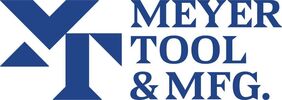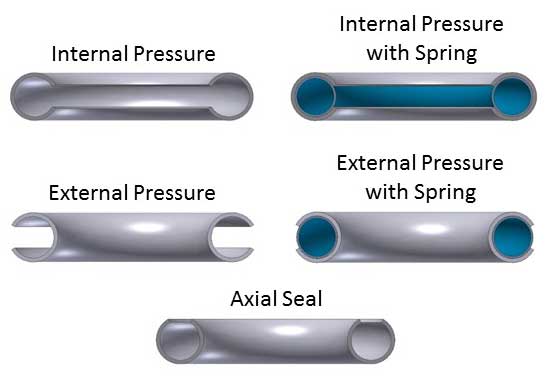Call: 708-425-9080
C-ring Seals – A Versatile Solution for Extreme Sealing Environments
This is a technical information article only. Meyer Tool manufactures custom pressure, vacuum and cryogenic systems. We use c-rings for certain applications.
Meyer Tool does not manufacture or distribute C-rings.
Meyer Tool does not manufacture or distribute C-rings.
A critical element in designing any vacuum or pressure vessel is determining the appropriate sealing techniques to employ. Often removable flanges or panels are required for the vacuum chamber or pressure vessel to function, which necessitates the use of removable seals. A wide variety of metal and elastomeric seal technologies have been developed throughout the years to meet the needs of various environmental and geometric scenarios. C-ring seals are used in a variety of demanding applications including jet engines, space applications and oil, gas and chemical equipment.
C-ring seals are named after their C-shaped cross-section. The seal is traditionally seated in a properly sized seal groove and compressed by a mating surface. It is also possible to use C-ring seals in an axial configuration to seal against a shaft. Common C-ring configurations are shown in Figure 1 above, including both standard C-ring seals and spring energized C-ring seals. Spring energized C-rings have a spring contained within the inner diameter of the c-ring. When the C-ring is compressed the C-ring material is pressed into the sealing surfaces of the part, deforming to fill surface imperfections and creating a tight seal. This mode of sealing is not unlike other commonly utilized metal gasket sealing techniques including knife-edge seals and metal o-ring and wire seals. Two primary characteristics of C-ring seals differentiate them from other metal sealing approaches:
C-ring seals can be used under a variety of harsh environmental conditions under both extreme pressure (up to 38,000 psi) and ultra-high vacuum loads. Depending on the material composition selected, C-ring seals perform well from liquid helium temperatures up to 1600° F. Inconel alloys are the most common base materials used to construct C-ring seals, although a number of alternative materials are available depending on the intended application. Surface coatings are typically applied to the C-ring to provide a ductile layer that can more easily fill surface imperfections in the sealing surfaces and improve sealing performance. Various coating materials and coating thicknesses can be specified. C-ring seals perform best when sealing surfaces are highly polished (Ra = 8-16 micro inch), especially when uncoated C-rings are used. Surface coatings can be utilized to mitigate higher surface roughness. It is highly recommended that all mating surfaces be turned with a circular lay to avoid scratches and other defects that run perpendicular to the seal. Care must be taken when specifying both the base material and the surface coating to ensure that the seal will perform well through the entire temperature and pressure ranges required by the application, as well as withstand any corrosive elements present.
C-ring seals offer a high performance sealing solution that can cope with both pressure and temperature extremes. The complex design and sophisticated surface coatings applied to C-rings means that these seals come at a cost premium relative to other metal and polymer seals. At Meyer Tool, our engineers and technicians are familiar with the details of properly selecting C-ring seals as well as designing and assembling leak tight C-ring flange joints. Understanding the why of how something works is part of our commitment to Reducing Project Risk, to ensure our customers achieve the lowest total cost of ownership.
- The C-shaped cross section of the seal allows for significant elastic deformation of the seal to take place under only moderate sealing forces when compared to other metal seals. This provides a spring force against the sealing surface at all times. It also means that the required clamping loads to properly seat the seal are reduced, which allows for lighter weight flange components to be used. Spring energized C-ring seals provide improved leak rate performance over standard C-rings, but require more clamping force to fully seal.
- Because the open face of the C-ring faces the direction of the pressure load, the applied chamber pressure (or vacuum) forces the C-ring to expand further into the sealing surfaces, increasing the effective sealing force. This is referred to as a “self-energizing” design.
C-ring seals can be used under a variety of harsh environmental conditions under both extreme pressure (up to 38,000 psi) and ultra-high vacuum loads. Depending on the material composition selected, C-ring seals perform well from liquid helium temperatures up to 1600° F. Inconel alloys are the most common base materials used to construct C-ring seals, although a number of alternative materials are available depending on the intended application. Surface coatings are typically applied to the C-ring to provide a ductile layer that can more easily fill surface imperfections in the sealing surfaces and improve sealing performance. Various coating materials and coating thicknesses can be specified. C-ring seals perform best when sealing surfaces are highly polished (Ra = 8-16 micro inch), especially when uncoated C-rings are used. Surface coatings can be utilized to mitigate higher surface roughness. It is highly recommended that all mating surfaces be turned with a circular lay to avoid scratches and other defects that run perpendicular to the seal. Care must be taken when specifying both the base material and the surface coating to ensure that the seal will perform well through the entire temperature and pressure ranges required by the application, as well as withstand any corrosive elements present.
C-ring seals offer a high performance sealing solution that can cope with both pressure and temperature extremes. The complex design and sophisticated surface coatings applied to C-rings means that these seals come at a cost premium relative to other metal and polymer seals. At Meyer Tool, our engineers and technicians are familiar with the details of properly selecting C-ring seals as well as designing and assembling leak tight C-ring flange joints. Understanding the why of how something works is part of our commitment to Reducing Project Risk, to ensure our customers achieve the lowest total cost of ownership.
- Parker Hannifin Corporation, Metal Seal Design Guide, 2013




